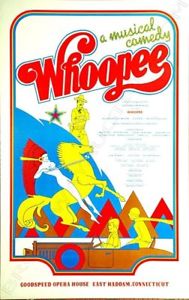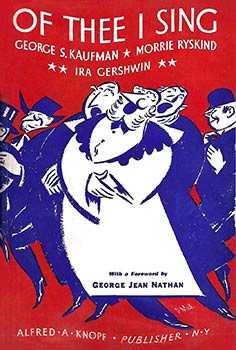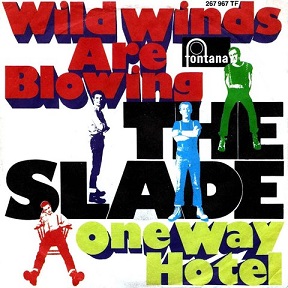
Richard Charles Rodgers was an American composer who worked primarily in musical theater. With 43 Broadway musicals and over 900 songs to his credit, Rodgers was one of the most well-known American composers of the 20th century, and his compositions had a significant influence on popular music.

Shirley Mae Jones is an American actress and singer. In her six decades in show business, she has starred as wholesome characters in a number of musical films, such as Oklahoma! (1955), Carousel (1956), and The Music Man (1962). She won the Academy Award for Best Supporting Actress for playing a vengeful prostitute in Elmer Gantry (1960). She played the lead role of Shirley Partridge, the widowed mother of five children, in the musical situation-comedy television series The Partridge Family (1970–1974), which co-starred her real-life stepson, David Cassidy, son of Jack Cassidy.

This article is about music-related events in 1851.

Whoopee! is a 1928 musical comedy with a book based on Owen Davis's play, The Nervous Wreck. The musical libretto was written by William Anthony McGuire, with music by Walter Donaldson and lyrics by Gus Kahn. The musical premiered on Broadway in 1928, starring Eddie Cantor, and introduced the hit song "Love Me or Leave Me", sung by Ruth Etting.

Charles William Shirley Brooks was an English journalist and novelist. Born in London, he began his career in a solicitor's office. Shortly afterwards he took to writing, and contributed to various periodicals. In 1851 he joined the staff of Punch, to which he contributed "Essence of Parliament," and on the death of Mark Lemon in 1870 he succeeded him as editor. He published a few novels, including Aspen Court and The Gordian Knot.

Of Thee I Sing is a musical with a score by George Gershwin, lyrics by Ira Gershwin and a book by George S. Kaufman and Morrie Ryskind. The musical lampoons American politics; the story concerns John P. Wintergreen, who runs for President of the United States on the "love" platform. When he falls in love with the sensible Mary Turner instead of Diana Devereaux, the beautiful pageant winner selected for him, he gets into political hot water.
The "North Dakota Hymn" is the state song of the U.S. state of North Dakota. It was written by poet James Foley at the request of North Dakota Superintendent of Public Instruction Minnie Nielson in 1926 to the tune of "The Austrian Hymn". Dr. Clarence Simeon "C.S." Putnam arranged the music with distinct ragtime syncopation.

Kathleen Alice Mattea is an American country music and bluegrass singer. Active since 1984 as a recording artist, she has charted more than 30 singles on the Billboard Hot Country Songs charts, including four that reached No. 1: "Goin' Gone", "Eighteen Wheels and a Dozen Roses", "Come from the Heart", and "Burnin' Old Memories", plus 12 more that charted within the top ten. She has released 14 studio albums, two Christmas albums, and one greatest hits album. Most of her material was recorded for Universal Music Group Nashville's Mercury Records Nashville division between 1984 and 2000, with later albums being issued on Narada Productions, her own Captain Potato label, and Sugar Hill Records. Among her albums, she has received five gold certifications and one platinum certification from the Recording Industry Association of America (RIAA). She has collaborated with Dolly Parton, Michael McDonald, Tim O'Brien, and her husband, Jon Vezner. Mattea is also a two-time Grammy Award winner: in 1990 for "Where've You Been", and in 1993 for her Christmas album Good News. Her style is defined by traditional country, bluegrass, folk, and Celtic music influences.

Rebecca of Sunnybrook Farm is a 1938 American musical comedy film directed by Allan Dwan, and written by Don Ettlinger, Karl Tunberg, Ben Markson and William M. Conselman, the third adaptation of Kate Douglas Wiggin's 1903 novel of the same name.

A Matter of Life and Death is the fourteenth studio album by English heavy metal band Iron Maiden. It was released on 25 August 2006 in Italy and Finland and 28 August worldwide—excluding the US, Canada and Japan, where it was released on 5 September. It is the first album in Iron Maiden's career to enter the US Billboard charts in the top 10, achieving significant chart success in many other countries as well.
The 18th Golden Globe Awards, honoring the best in film for 1960, were held on March 16, 1961.

Music and Lyrics is a 2007 American musical romantic comedy-drama film written and directed by Marc Lawrence. It focuses on the relationship that evolves between a former pop music idol and an aspiring writer as they struggle to compose a song for a reigning pop diva.
A wigwam is a single-room Native American dwelling.

Little Miss Broadway is a 1938 American musical drama film directed by Irving Cummings. The screenplay was written by Harry Tugend and Jack Yellen. The film stars Shirley Temple in a story about a theatrical boarding house and its occupants, and was originally titled Little Lady of Broadway. In 2009, the film was available on DVD and videocassette.

"Indian Love Call" is a popular song from Rose-Marie, a 1924 operetta-style Broadway musical with music by Rudolf Friml and Herbert Stothart, and book and lyrics by Otto Harbach and Oscar Hammerstein II. Originally written for Mary Ellis, the song achieved continued popularity under other artists and has been called Friml's best-remembered work.

The Final Frontier is the fifteenth studio album by English heavy metal band Iron Maiden. It was released on 13 August 2010 in Germany, Austria and Finland, 17 August in North America, 18 August in Japan, and 16 August worldwide. At 76 minutes and 34 seconds, it is the band's third-longest studio album to date, a duration surpassed only by 2015's The Book of Souls and 2021's Senjutsu. Melvyn Grant, a long-time contributor to the band's artwork, created the cover art. It is the band's final album to be released through EMI Records, marking the end of their 30-year relationship. It is also the last album to use the band's alternate logo. While not a concept album, themes of exploration, expectation, and discovery are frequent throughout. The Final Frontier is the band's first studio album in nearly four years, making it one of the longest gaps between one album and the following.
The 1994 Soul Train Music Awards were held on Tuesday, March 15, 1994, at the Shrine Auditorium in Los Angeles, California. The show was hosted by Patti LaBelle, Gladys Knight and Johnny Gill.
Love in a Maze is an English broadside ballad that dates back, from estimation by the English Short Title Catalogue, to the 1640s, which immediately coincides with the publication of James Shirley's play, The Changes, or Love in a Maze, in 1639. The full title of the ballad is: "Love in a MAZE: / OR, The Young-man put to his Dumps. / Here in this Song you may behold and see / A gallant Girl obtain'd by Wit and Honesty; / All you that hear my Song, and mark it but aright, / Will say true love's worth gold, and breeds delight." It is set to the tune of, "The True Lovers Delight; Or, The Cambridge Horn." The ballad's opening lines are, "LAte in the Morning as I abroad was walking,/All in a meadow green, I heard two Lovers talking;." Extant copies of the ballad can be found at the Glasgow University Library, the British Library, the Huntington Library, the Pepys Library at Magdalene College, and the National Library of Scotland.

"Wild Winds Are Blowing" is a song by the British rock band Slade, released in 1969 as a non-album single under the name "The Slade". The song was written by Bob Saker and Jack Winsley, and produced by Chas Chandler. It failed to make an appearance in the UK charts.
William F. Hanson was an American composer and music teacher who served as professor of music at Brigham Young University who specialized in Native American music. He studied, composed, and taught music. He is most well known for working with Zitkala-Sa on The Sun Dance Opera, an opera based on the sacred ritual of the Lakota Sun Dance.














